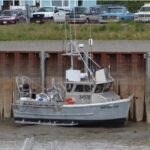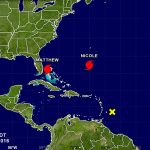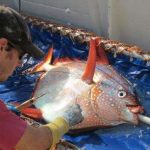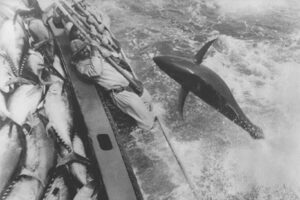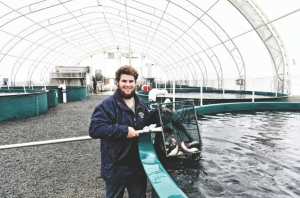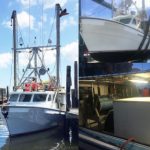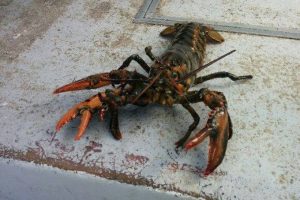With Coronavirus pandemic ravaging our country, temporary relaxation of fishery regulations is urged to help fishing industry
 With the Corona pandemic ravaging our country, and the rest of the world, causing death and economic destruction everywhere, our government has stepped up to the plate and delivered a number of welcomed economic stimulus aid packages. Thanks to our Senators and Congressmen who worked to get specific aid to the fishing industry, that has been hit particularly hard by the closure of restaurants, where 70 per cent of seafood in this country is consumed. Fishermen and wholesalers have had to adapt on the fly and find other ways to market their product to various degrees of success. The closure of so many vital aspects of our domestic economy will have effects that will still be felt a long time after the Virus is tamed. Many small businesses are not going to be able to survive a lengthy shutdown, and with no money coming in for them they will default on money owed. This will cause a chain reaction up the supply line, from restaurants and fish markets, to their wholesale suppliers, to the first point of sale at the unloading dock, and then the boat. Everyone in the seafood business will be negatively touched by this chain bankruptcy, I just hope that the aid package takes into account this damaging problem, which will also affect all types of businesses throughout the country. Regarding the aid package, it is complicated and I recommend getting legal advice on how best to apply.
With the Corona pandemic ravaging our country, and the rest of the world, causing death and economic destruction everywhere, our government has stepped up to the plate and delivered a number of welcomed economic stimulus aid packages. Thanks to our Senators and Congressmen who worked to get specific aid to the fishing industry, that has been hit particularly hard by the closure of restaurants, where 70 per cent of seafood in this country is consumed. Fishermen and wholesalers have had to adapt on the fly and find other ways to market their product to various degrees of success. The closure of so many vital aspects of our domestic economy will have effects that will still be felt a long time after the Virus is tamed. Many small businesses are not going to be able to survive a lengthy shutdown, and with no money coming in for them they will default on money owed. This will cause a chain reaction up the supply line, from restaurants and fish markets, to their wholesale suppliers, to the first point of sale at the unloading dock, and then the boat. Everyone in the seafood business will be negatively touched by this chain bankruptcy, I just hope that the aid package takes into account this damaging problem, which will also affect all types of businesses throughout the country. Regarding the aid package, it is complicated and I recommend getting legal advice on how best to apply.
In regard to fishery regulations, NMFS has acted quickly to address the health issue of Fishery observers being placed on vessels at this time of an unprecedented national pandemic by suspending their operations. This is a good thing for all involved especially when social distancing is hard to practice on a fishing boat. There are a number of things that NMFS can do to help both the commercial and recreational fishing industry’s by temporarily relaxing some regulations on stocks that are healthy and could withstand a little extra effort.
Recreational fishermen are watching as the beginning of some of their seasons have started and they are not able to participate. [MRIP numbers next year will probably still show record landings for this period]. Since most of these fisheries take place in state waters, regulations vary state by state, and are managed by coastal commissions, such as the Atlantic States Marine Fishery Commission. They still are bound by the harvest quota’s that are set by the stock assessment scientists in our regional fishery science centers. In light of the economic damage being caused by the closure of much of our economy many people will find themselves out of work and not even being able to afford food to feed their families. Here is where our state and federal government can help without spending much money. A temporary reduction in recreational size limits, bag limits and a lengthening of seasons for certain species of fish that are considered healthy and not overfished, should be implemented on a state by state, specie by specie basis. Special consideration should be given to the Party and Charter boat industry’s as they have been the hardest hit segment of the fishing industry.
On the east coast a perfect opportunity exists to do what many fishermen have been asking for years, reduce the minimum size limit of recreational caught Summer Flounder. Many states have minimum size limits of 18 inches or more and the discard problem is well documented as fishermen throw over 20 fish to keep one. This summer, reduce the size limit to 16 inches, which will also reduce the discard ratio and not harm the stock. Since management has not been able to address this issue for various reasons, an emergency may be the best chance to open the eyes of those who insist on killing all the spawning stock biomass. [90% of summer Flounder over 18 inches are female]. Presently in New Jersey the Blackfish season is open, yet no one can participate, this presents the opportunity to either increase the bag limit or lengthen the season, while not actually affecting the over all catch of this species which is overfished. In every state in our country opportunities are there to help feed the public if our fishery managers are allowed to address them, and that takes Federal cooperation.
There are also opportunities to help commercial fisheries by a temporary relaxation of regulations. The New Jersey Lobster fishery is set for a mandatory closure for all of May, in which all pots must be removed from the water. This not only presents a problem for the work and expenses of
lifting the gear and bringing it home, but also then returning them to the water a month later. This closure is mandated by the ASMFC to address overfishing, but the problem with Lobsters in both New Jersey and New York is not overfishing, it is Climate induced, and the closure will not affect the
population, they’re busy moving east to cooler climes. Keep the season open this year to help these fishermen out, since this is a time sensitive problem emergency action needs to take place for it to happen. Throughout our country there are opportunities to help out the fishing industry without using public funds by temporary measures to allow increases in quota, reductions in regulations, or changes in bag and size limits or seasons.
I am requesting that NMFS immediately contact the various management councils and commissions to request that special meetings [webinars] of fishery advisory panels be held to discuss the pro’s and cons of this idea, and what fisheries could benefit. The domestic fishing industry has had
to find alternative methods to sell their product, and the American public is reacting positively to it by being able to eat fresh off the boat seafood. Years ago one of the tasks that was given to the National Marine Fishery Service was the protection and promotion of the domestic fishing industry, we see how well that worked out with seafood imports now dominating the market. When the regional fishery management councils were created they were complimented by regional fishery development councils. Most of these died a slow death 30 years ago as the money did not go where it was needed in most cases but to Grant hungry bureaucrats who wasted a lot of it. Staltonstal Kennedy funds provided that money and it has been high jacked by every government department that could lay reasonable claim to it. Maybe somebody can find some money to do national level advertising to promote fresh US produced seafood like the money was originally intended to do.
Thank you, Jim Lovgren

































